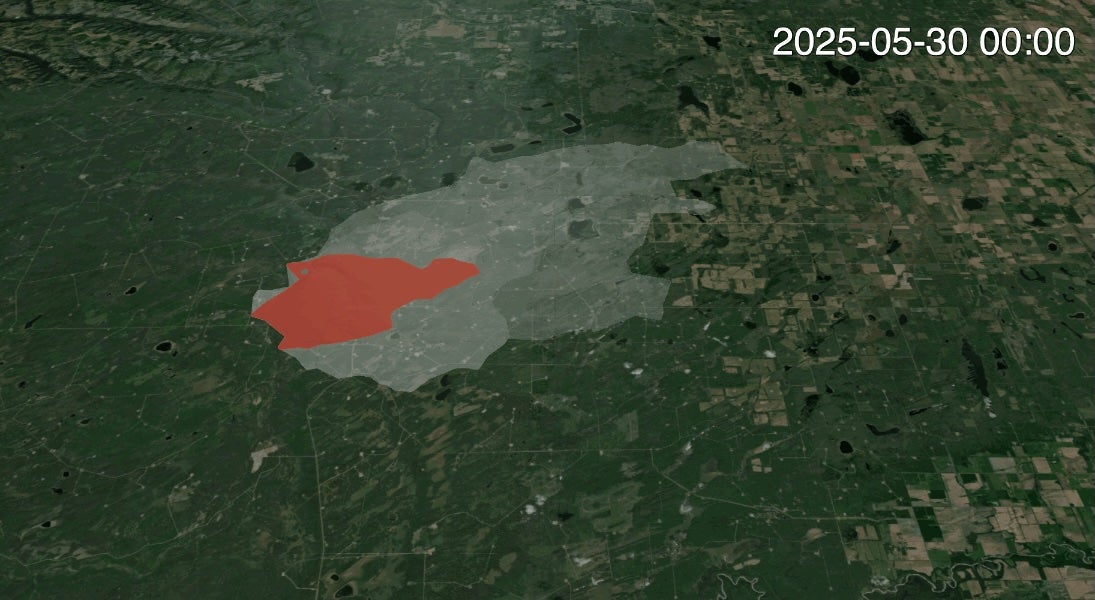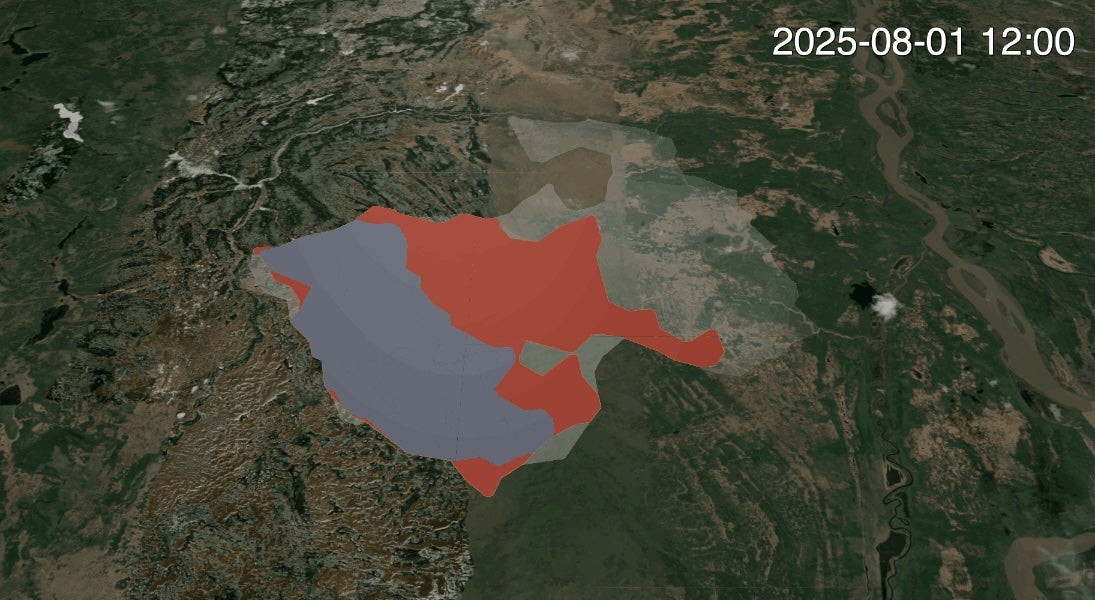As wildfires grow more frequent and severe across Canada, University of Waterloo researchers and students are stepping up with innovative, data-driven solutions.
Among them is Faculty of Science student Dante Maggiotto, and his team of student researchers who are developing Firebird - a cutting-edge platform that integrates artificial intelligence (AI), satellite imagery and meteorological data to forecast high-risk zones by modeling wildfires and how they spread.
"Now is the most important time to be developing solutions for climate-related challenges," Maggiotto says. "We want to move wildfire management from reactive firefighting to proactive mitigation."
The urgency is clear: around 60 per cent of all land burned in Canada due to wildfires over the past decade occurred during just the 2023 and 2024 seasons, Maggiotto explains. The 2016 Fort McMurray fires alone caused nearly $10 billion in damages, making them the most economically devastating natural disaster in Canadian history.
 Firebird is one of many ventures emerging from Waterloo's innovation ecosystem, where students are empowered to tackle global challenges through interdisciplinary research, entrepreneurial thinking and a commitment to building a sustainable future.
Firebird is one of many ventures emerging from Waterloo's innovation ecosystem, where students are empowered to tackle global challenges through interdisciplinary research, entrepreneurial thinking and a commitment to building a sustainable future.
With support from programs like Enterprise Co-op (E Co-op) and Velocity, Maggiotto and his team are turning their research in wildfire forecasting and prevention into scalable, data-driven solutions.
Firebird's early prototype of an Alberta grid visualizing wildfire ignition and spread.
From reactive firefighting to proactive mitigation
In wildfire management, every hour counts - the difference between a contained spark and a regional disaster can be measured in minutes. Firebird's technology analyzes spatial-temporal patterns to generate predictive maps that pinpoint high-risk areas with precision, before fires ignite. This enables governments, industries and fire crews to allocate resources more effectively and respond before small blazes escalate into uncontrollable disasters.
Unlike traditional active wildfire models, Firebird uses deep learning to process large volumes of data in real time. Firebird's hybrid approach of combining satellite and ground-based sensing allows for faster, more accurate forecasting that's continuously validated against actual fire incidents.


"Canada is in the midst of its second-worst wildfire season on record, with more than 7.3 million hectares burned as of mid-August - an area the size of New Brunswick," explains Ibraheem Azhar, co-founder of Firebird and a fourth-year Science and Business student.
"That's more than double the 10-year average. With three [wildfire seasons] in the last three years now ranking among the worst in Canadian history, it's clear these wildfire seasons aren't anomalies - they're becoming the new normal."
The team is also developing an industry-grade wildfire spread model that applies physics-based principles - such as fluid and combustion dynamics - to forecast how fires move across different terrains. Running on high-performance computing, the system integrates imagery, human activity, weather and topographic data to deliver scalable, real-time simulations.

Firebird's industry-grade wildfire spread model that applies physics-based principles - such as fluid and combustion dynamics - to forecast how fires move across different terrains
"Our mission is to lead the charge in environmental stewardship by deeply understanding wildfires," Maggiotto says. "We want Firebird to be the go-to tool in wildfire resilience - protecting forests, safeguarding communities and empowering fire crews who defend them."
Through its Application Programming Interface (API) and Software as a Service (SaaS) licensing model, Firebird allows government agencies to automatically receive wildfire risk updates and integrate them into their own systems. The forecasts are easy to visualize through interactive map layers and accessible via a user-friendly online platform.
Firebird is currently modeling across Alberta and plans to begin pilot testing in 2026, supported by early impact case studies.
From research idea to impact: Powered by campus supports
Maggiotto, a fourth-year co-op student, co-founded Firebird alongside fellow students Ibraheem Azhar and Teodora Vujovic, as well as alum J. Romero (BSc '24). As Albertan residents, Azhar and Romero felt a strong connection to the issue and knew that building a scalable solution would require an interdisciplinary approach. Together, the team brings expertise in computer science, business, fire science and forest management- uniting their strengths to address one of Canada's most pressing challenges.
Many students join the E Co-op program to launch their own businesses while earning a standard 16-week co-op credit. For Maggiotto, the program offered more than just academic credit - it was a launchpad for Firebird.
With guidance from Dr. Wayne Chang, E Co-op coordinator, Maggiotto received valuable feedback and networking opportunities that helped transform Firebird from a student project into a scalable startup.
"Dr. Chang has an incredible network within Waterloo's ecosystem and beyond," Maggiotto says. "He made key introductions that helped us connect with industry experts and gain early traction. Those connections were instrumental in accelerating Firebird's development far beyond what we could have imagined."
As part of the program, Maggiotto pitched Firebird at the Spring 2025 E Co-op Pitch Competition, where he secured $5,000 in funding through the E-Launch Award - Firebird's first external funding.
During the same term, the Firebird team joined Velocity's inaugural Summer Accelerator - an intensive program hosted at the Innovation Arena to support student founders. Around 20 startup teams received mentorship, legal and business guidance, and introductions to early customers.
"Demo Day was a pinnacle moment," Maggiotto explains. "It gave us a chance to reflect on our progress and share our vision for what's next. But the most impactful part was working in a community of founders who inspired and motivated us daily."
Maggiotto's entrepreneurial drive was also shaped by years of involvement with Socratica - one of Canada's fastest-growing student maker collectives - and a range of student-led organizations at Waterloo.
Through programs like E Co-op and Velocity, Waterloo empowers students to turn bold ideas into real-world solutions. With access to mentorship, funding and a vibrant community of innovators, students like Maggiotto are equipped to navigate the startup journey with confidence and transform classroom concepts into real-world ventures.






